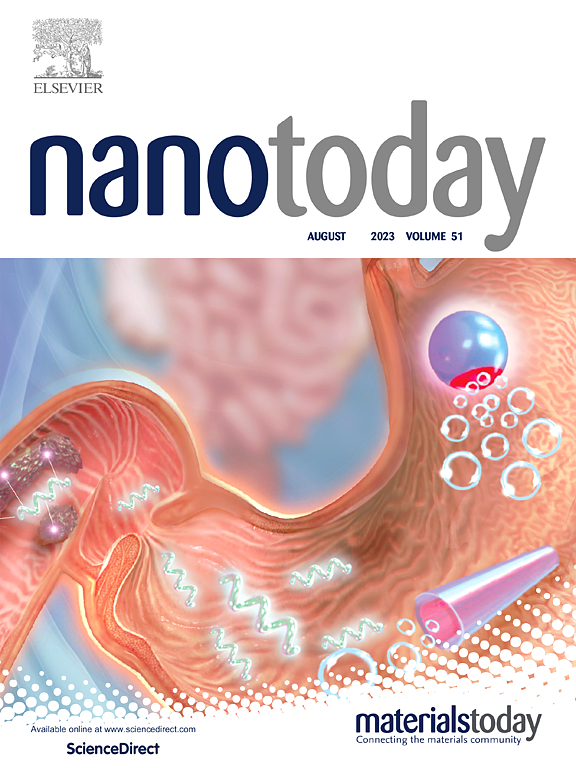用于重塑肿瘤内T细胞生态位的双细胞靶向表观遗传纳米编辑器
IF 13.2
1区 材料科学
Q1 CHEMISTRY, MULTIDISCIPLINARY
引用次数: 0
摘要
基于T细胞的免疫疗法仅使少数患者受益,主要是由于CD8+ T细胞数量不足和功能衰竭。然而,解决这两个挑战的综合战略仍然很少。表观遗传失调最近被认为是肿瘤微环境中干扰T细胞反应的重要因素。在此,我们开发了一种表观遗传纳米编辑器(P@cPG/sg),可以同时靶向肿瘤细胞和T细胞中的表观遗传赖氨酸特异性去甲基化酶1 (LSD1),对肿瘤内T细胞生态位进行重编程。该纳米编辑器由两种胍基阳离子载体与lsd1靶向CRISPR/Cas9质粒络合而成,可解交联成肿瘤细胞靶向纳米颗粒(PMG/sg)和T细胞靶向纳米颗粒(PTG/sg)。PMG/sg下调肿瘤细胞中的LSD1,导致促进CD8+ T细胞浸润的趋化因子上调。同时,PTG/sg降低T细胞中的LSD1,降低PD-1表达,显著增强T细胞增殖,使耗尽的细胞毒性CD8+ T细胞原位恢复活力。同时LSD1敲除建立了一个自我强化的抗肿瘤免疫级联,在小鼠和人源化胃癌模型中实现了超过75% %的肿瘤生长抑制。因此,这种纳米编辑器代表了一种独立的表观遗传免疫疗法,可以同步增强肿瘤内CD8+ T细胞的数量和效应功能,克服当前基于T细胞的免疫疗法的关键局限性。本文章由计算机程序翻译,如有差异,请以英文原文为准。
A dual-cell-targeting epigenetic nano-editor for reshaping the intratumoral T cell niche
T cell-based immunotherapies benefit only a minority of patients, primarily due to insufficient CD8+ T cell quantity and functional exhaustion. However, integrated strategies addressing both challenges remain scarce. Epigenetic dysregulation has recently been recognized as an important factor interfering with T cell responses in the tumor microenvironment. Herein, we develop an epigenetic nano-editor (P@cPG/sg) that simultaneously targets the epigenetic lysine-specific demethylase 1 (LSD1) in both tumor cells and T cells to reprogram the intratumoral T cell niche. The nano-editor consists of two guanidinium-based cationic carriers complexed with LSD1-targeting CRISPR/Cas9 plasmids, and can de-crosslink into tumor cell-targeting nanoparticles (PMG/sg) and T cell-targeting nanoparticles (PTG/sg). PMG/sg downregulates LSD1 in tumor cells, leading to the upregulation of chemokines that promote CD8+ T cell infiltration. Meanwhile, PTG/sg reduces LSD1 in T cells, lowering PD-1 expression, significantly enhancing T cell proliferation and rejuvenating exhausted cytotoxic CD8+ T cells in situ. Simultaneous LSD1 knockdown establishes a self-reinforcing cascade of anti-tumor immunity, achieving over 75 % tumor growth inhibition in both murine and humanized gastric cancer models. Thus, this nano-editor represents a standalone epigenetic immunotherapy that synchronously enhances intratumoral CD8+ T cell quantity and effector function, overcoming key limitations of current T cell-based immunotherapies.
求助全文
通过发布文献求助,成功后即可免费获取论文全文。
去求助
来源期刊

Nano Today
工程技术-材料科学:综合
CiteScore
21.50
自引率
3.40%
发文量
305
审稿时长
40 days
期刊介绍:
Nano Today is a journal dedicated to publishing influential and innovative work in the field of nanoscience and technology. It covers a wide range of subject areas including biomaterials, materials chemistry, materials science, chemistry, bioengineering, biochemistry, genetics and molecular biology, engineering, and nanotechnology. The journal considers articles that inform readers about the latest research, breakthroughs, and topical issues in these fields. It provides comprehensive coverage through a mixture of peer-reviewed articles, research news, and information on key developments. Nano Today is abstracted and indexed in Science Citation Index, Ei Compendex, Embase, Scopus, and INSPEC.
 求助内容:
求助内容: 应助结果提醒方式:
应助结果提醒方式:


